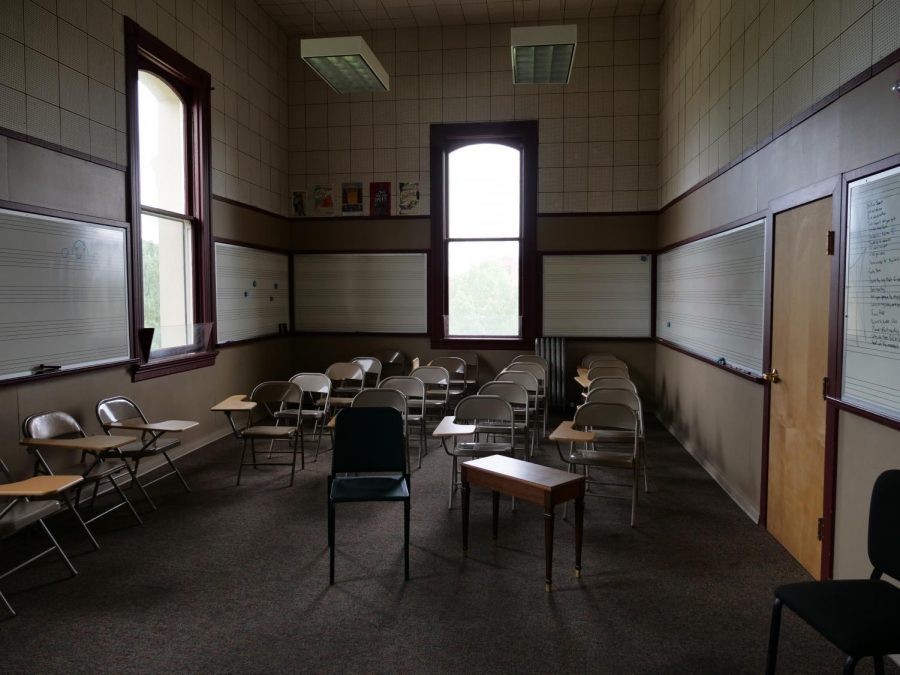OSU plans to elevate arts with modern facility
June 25, 2018
Anonymous donation and fundraising efforts lead to upgrades for the School of Arts and Communication
Oregon State University’s School of Arts and Communication, home to the art, music, new media communications and theater arts departments, is preparing to receive a modern arts and education complex in 2022.
On April 19, 2017, President of Oregon State University Ed Ray sent out an all-student email confirming that a $25 million donation was made by an anonymous donor to Oregon State University’s School of Arts and Communication within the College of Liberal Arts. The donation will serve as the base of its funding.
Larry Rodgers, the dean of the college, explained the initial gift was just the beginning of the project. With additional fundraising increasing the total amount of private support to $30 million, Rodgers said the university is also seeking approval for $30 million in state bond support, turning the complex into a $60 million endeavor. The LaSells Stewart Center, which serves as a performing arts and conference center, will be the foundation of the renovation.
“Currently LaSells is approximately 40,000 square feet and we are enlarging the new building to over 100,000 square feet on the same location,” Rodgers said. “This building will show how much OSU values the arts to prospective students in the future. Every great university has a great library and student union, and every great university should have a place for students to interact with the arts.”
Chris Chapman, the director of bands, is excited about the future project and what it will provide for both faculty and students.
“We are thrilled about this,” Chapman said. “From what we understand there is going to be a band and orchestra room, choir room, full classrooms, offices for each faculty member and space for equipment and instrument storage.”
The music department will be greatly affected by the planned upgrade, Chapman noted. The music program will be relocated from Benton Hall to the new complex. Constructed in 1887, Benton Hall was the first academic building built on campus, initially housing 140 majors. As the college began to expand, programs left Benton Hall for other buildings better suited for their work. The department of music is the last remaining program in the building today.
“We are still here and we love Benton and I think our students love Benton,” said Steven Zielke, the Patricia Valian Reser Professor of Music. “But it is remarkably inadequate in terms of a good place to study music.”
Due to a lack of soundproofing throughout the building, the rooms in Benton Hall are unsuitable to rehearse or perform in, Chapman said.
“If you hear one student playing, the whole building would be able to hear them practicing,” Chapman said. “Students do not practice here because they do not want their mistakes to be heard by everybody, and making mistakes is a part of the process.”
Zielke said that windows must remain open when his choir is rehearsing, as the lack of air conditioning causes difficulties when he teaches and rehearses.
“Outside there may be a leaf blower,” Zielke said. “Leaf blowers play pitches, mowers have pitches and it’s really hard for us to sing when there’s a pitch-emanating device right outside our windows.”
Beyond the technical improvements, Zielke said one of the things he looks forward to is having all of the arts in one building where they can interact with each other.
“Once we start sharing a building you will see more collaboration between the arts,” Zielke said. “We do some already, operas and musical theaters, but I think you will see more ongoing collaboration with music and art, art and theater, and maybe dance someday.”
Even students that have never taken an art class, been in a play, sang in a choir or played in a band will be greatly affected by investment being made with the art and education complex, Zielke said.
“Arts make the entire environment better,” Zielke said. “This will not only improve the reputation of the campus, but it will improve the education of the campus regardless of major.”
























































































































